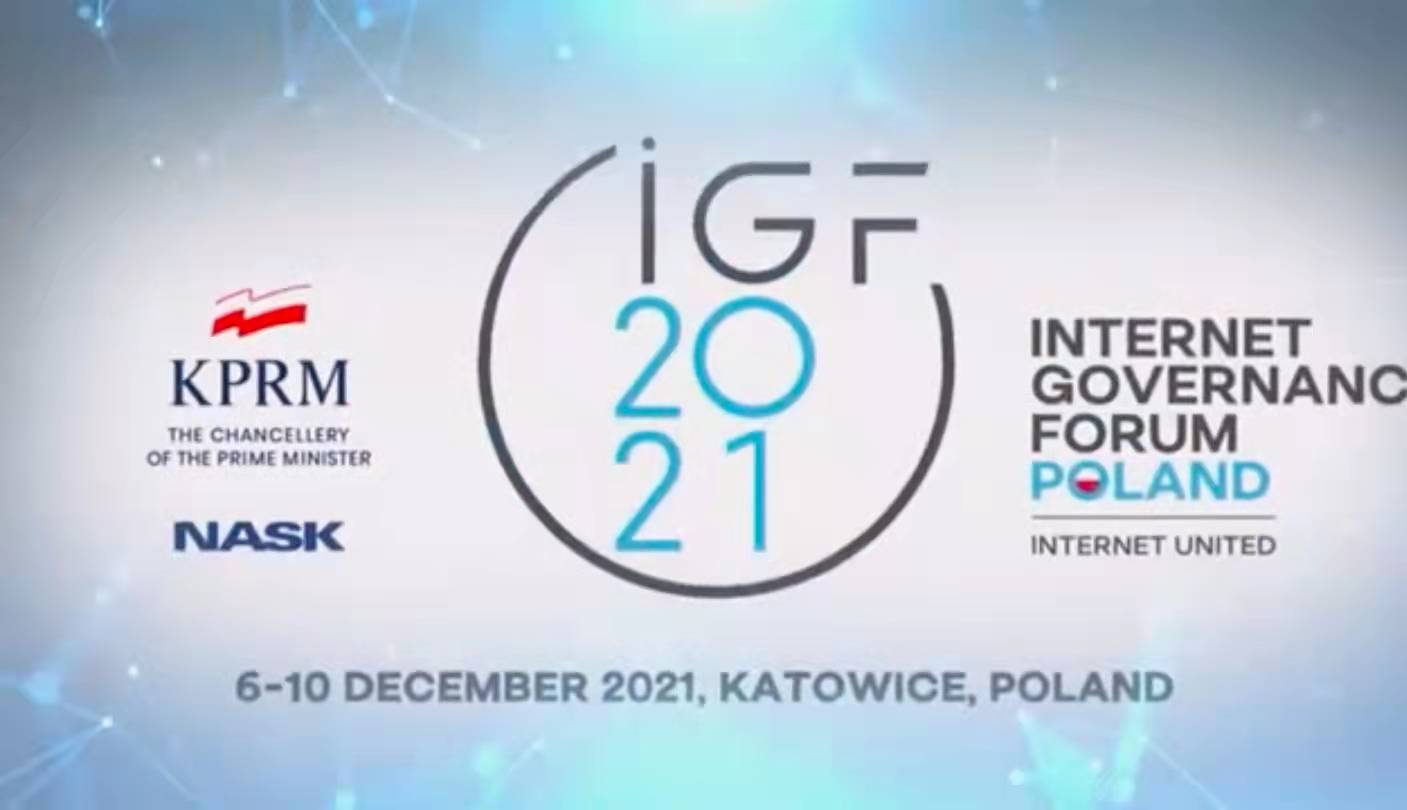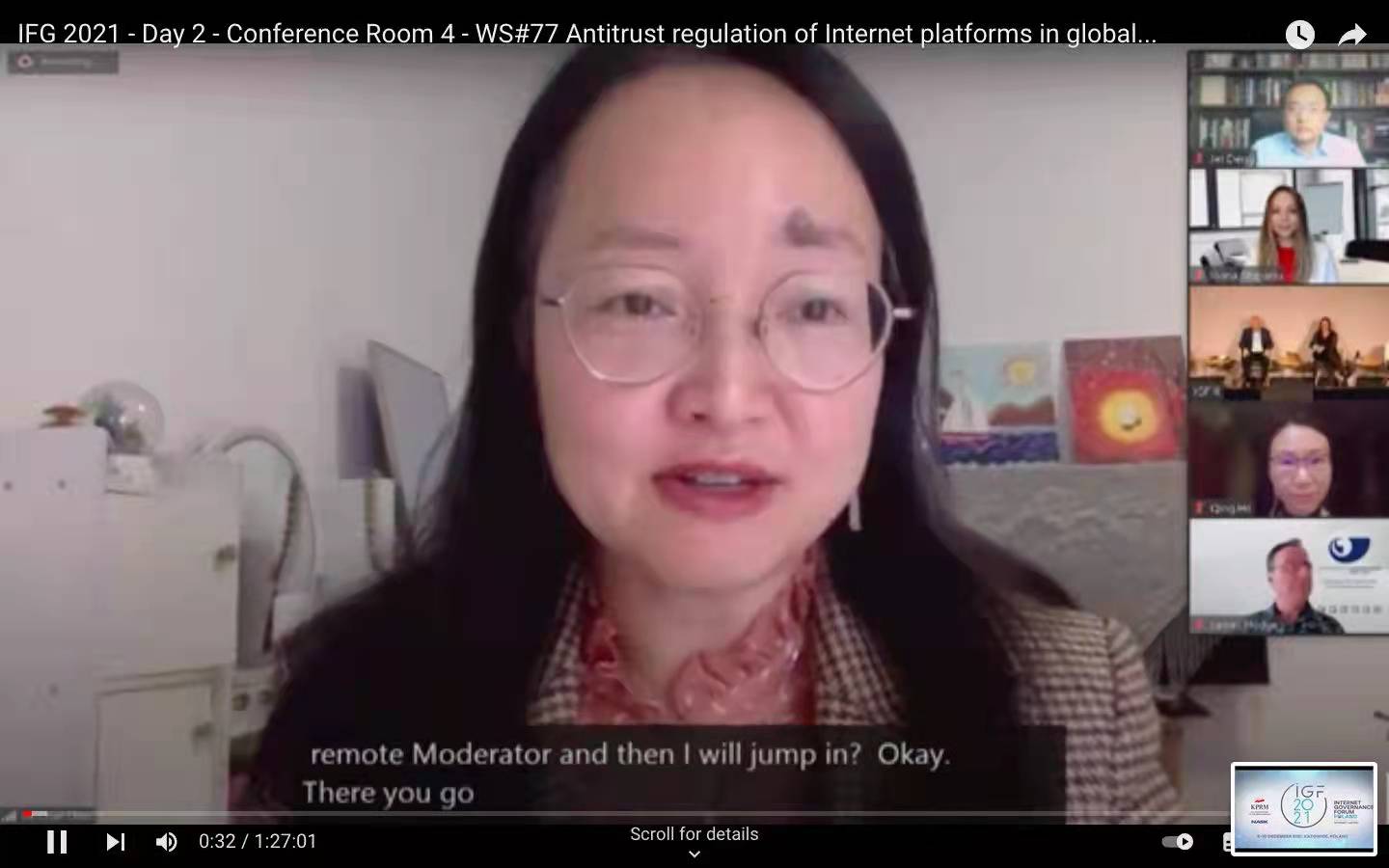The 2021 UN Internet Governance Forum’s "global Internet platform antitrust regulation" workshop was successfully held on December 8
Release Date: 2021-12-23Views:
From December 6 to December 10, 2021, the 16th annual meeting of the United Nations Internet Governance Forum was hosted by the Polish government online and offline at the same time. The annual meeting focused on "using the power of the Internet to deal with the risks of cyberspace". Government officials, scholars from all over the world, civil society groups and practitioners from various industries held thematic meetings around the relevant focus issues of the global Internet this year.

On December 8, the "global Internet platform antitrust regulation" roundtable workshop was successfully held. Dr. Yik Chan Chin, Associate Professor of the school of Journalism and communication of the Beijing Normal University, hosted the meeting. Invited speakers of the panel include Dr. Deng Zhisong, senior partner of Beijing Dacheng Law Firm, and Mr. James Hodge, chief economist of the South African Competition Commission, Ms. Albana karapanco, Senior Associate, Legal Services at PwC Albania, former adviser to the Minister of Finance and economy of Albania, Professor Milton Mueller of the Georgia Institute of Technology in the United States, and Dr. He Qing of the Beijing University of Posts and Telecommunications.

Dr. Yik Chan Chin hosted the meeting online
The roundtable discussed how to cooperate to deal with the structural problems of antitrust in the Internet market at the national and global levels, and how to ensure fair access to data, market and standards to promote competition and innovations. Speakers from the European Union, the United States, China and South Africa introduced the Internet antitrust regulations in their countries and regions, discussed the emerging antitrust issues from a global perspective, and responded to questions from the audience.
The results of this roundtable mainly include the following points:
1. the antitrust approaches of China, US, South Africa and EU
Dr. Qing He highlighted criteria in the Chinese antitrust regulations in evaluating platform’s monopoly including defining relevant market, determining market power, deciding whether monopoly has competitive effect (i.e. objective justifications of an abuse) and essential facilities doctrine.
Professor Milton Mueller pointed out that in US. The public has unstable views on the network effect, compatibility relationship and network externalities. The size and scale of the platforms is often a product of network externalities not abusive behavior, and the compatibility or network effects are desired by consumers and antitrust remedies often have no positive impact on them. Citing the example of Microsoft, he argued that what ultimately broke that monopoly was not so much antitrust activity, but the rise of middleware in the form of Java that made browsers possible and that applications could be run independently of the Microsoft operating system. the public need to decide whether to sacrifice compatibility and integration across these platforms for competition or whether people actually want this kind of compatibility.
Mr. James Hodge highlighted that for regulators to move from passive to active enforcement of antitrust requires the understanding of business models and consumer behaviors, separation of online and traditional markets, and new or different theories of harms.Regulatory cooperation and collaborations amongst different regulators across sectors and countries is needed at global and national levels in order to have an equal bargaining dynamic between big and small players and regulators. And Foreign anti-trust cases are useful reference for local authority to understand or predict the local platform’s business models.
Ms. Albana Karapanco pointed that while all states are pushing towards antitrust regulations. Every country is trying to level the playing field, the EU is more paternalistic than other jurisdictions. In the EU, competition authority moves towards tougher regulation of giant tech companies. Two legislations “Digital Service Acts” and “Digital Market Acts” in complimented with GDPR aim to create open and fair digital markets while protecting fundamental rights. Some cooperation is needed at the global scale. Small country is lagging behind the legislation of competition law.
2. Differences between Chinese, US, South Africa, and EU approaches in antitrust
Dr. Qing He pointed out the in terms of substantive perspective, there are several differences between US and Chinese antitrust regulations. Abusive conduct: in the US, legislation focuses on illegally maintaining dominate position of the platform; in Chinese, legislation focuses on the abusive conduct itself so that the leverage theory is applied in the Chinese cases. Essential facilities theory is applied in both countries, but Chinese law has defined specially what constitutes essential facilities.
Dr. Jet Zhisong Deng and Professor Milton Mueller both agreed that there is no significant differences between the Chinese, US or EU antitrust laws and judicial decisions other than procedures (in China, regulatory agency can decide the cases so that it can act swiftly; in USA, antitrust case is tried under the law by judiciary), the main difference is in the changes in the attitudes of governments in antitrust enforcements. Professor Mueller also pointed out that antitrust enforcement can be and often is political, either an assertion of the government's power over industry, as in China, or an attempt by competitors to gang up on a successful rival, as in Europe and the US. Therefore, detaching antitrust enforcement from its theoretical mooring in measures of market power and market definition is only likely to make it more political and less fair. Competition policy requires clear standards of what does and does not foster competition, otherwise it's just arbitrary and political.
Mr. James Hodge: public interest component is incorporated into S. African antitrust regulation to protect the participation of small business, such as fairness provision in bargaining with powerful buyers; and to ensure S. African companies’ participation in the global economy (whether S. African platforms could be push out from the market). Every country has different procedures and tools such as guidelines, laws or market hearings in their regulations.
3. How to address the uneven regulatory power of small countries and big countries in antitrust regulation of giant platforms?
Katharina from Georgian regulator and Alison from S. Africa both asked how to cooperation to protect the harm of giant platforms on small countries’ consumers; and the technical challenges in dealing with global players beyond local jurisdictions in enforcing remedies.
Mr. James Hodge and Dr. Jet Deng both agreed that apart from paying fines, many remedies do not work well because companies find ways to work around. Cooperation globally such as mechanism of regular dialogues in international competition is needed to have more collective influence over large platforms otherwise smaller countries will be left behind as well as to maintain diversity of communications. Besides, massive investment in human resources of regulatory agency to understand the business modes and technical issues is also required.
4. If antitrust is used as a proxy to address not only market power but also fundamental rights in the absence of common legal framework to regulate other issues such as FOE and content?
Ms. Albana Karapanco and Mr. James Hodge both agreed that competition law has shifted more towards to protection of privacy, inequality and access to platform besides regulating market power. While Professor Milton Mueller warned that using antitrust law to address broad "public interest" concerns such as content regulation or human rights is completely inappropriate, as that is not what competition policy is designed to do.
For a detailed English report, please see the following link:
For recorded video of meeting, please see the below link:




 京ICP备13009620号
京ICP备13009620号